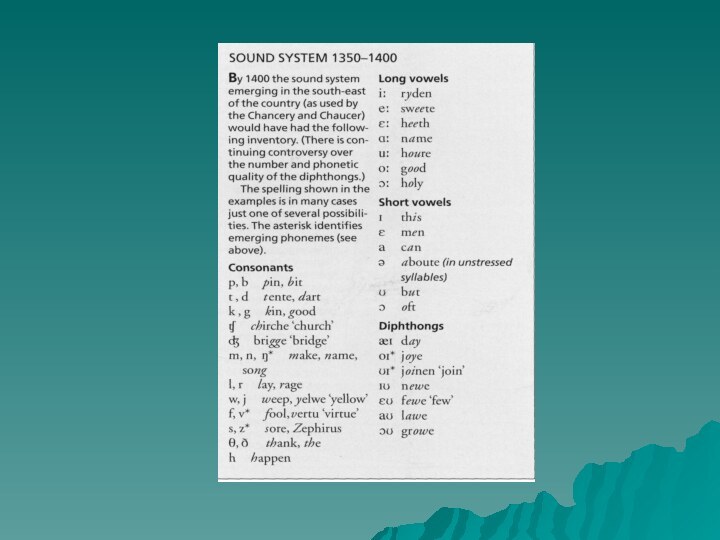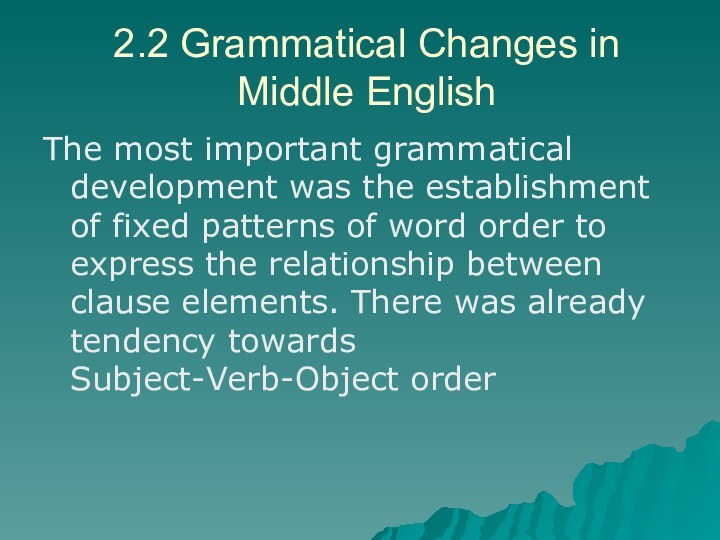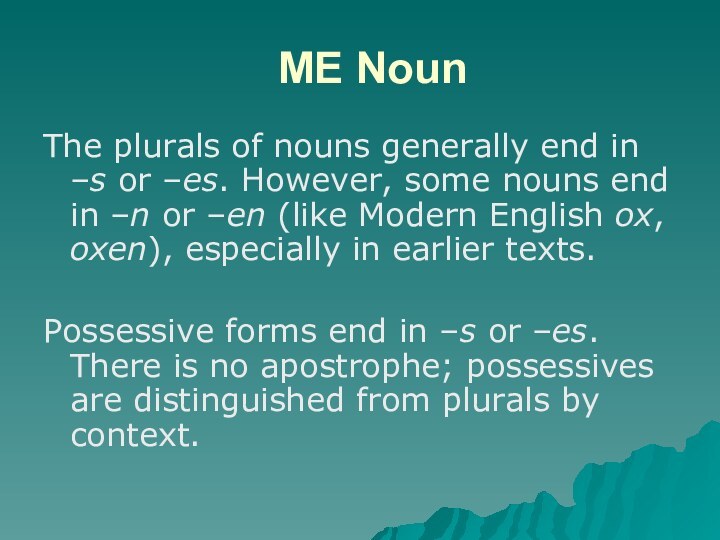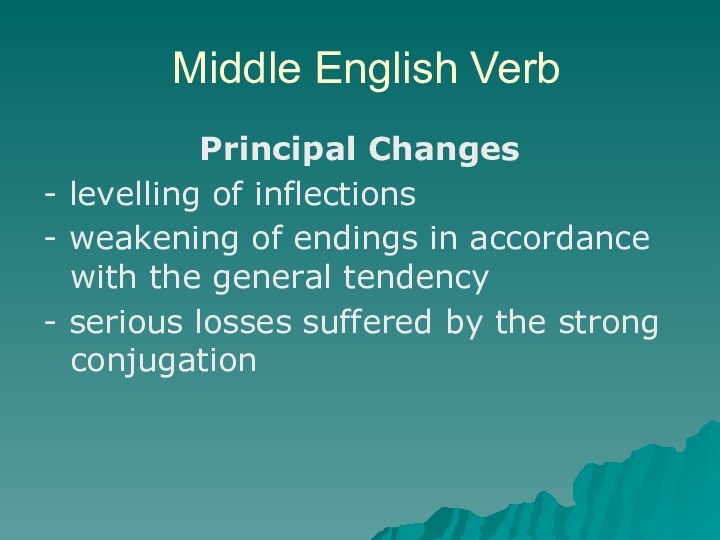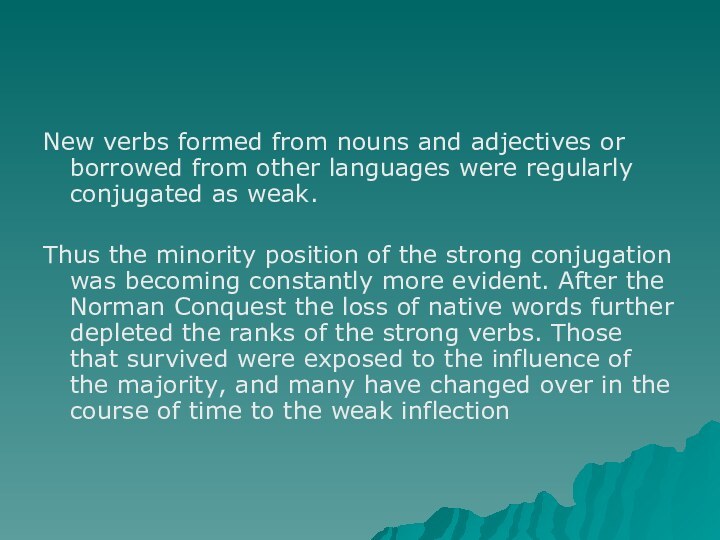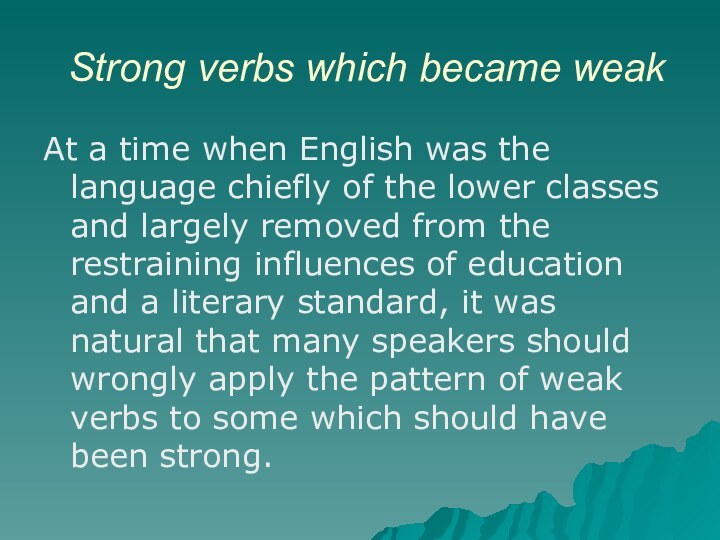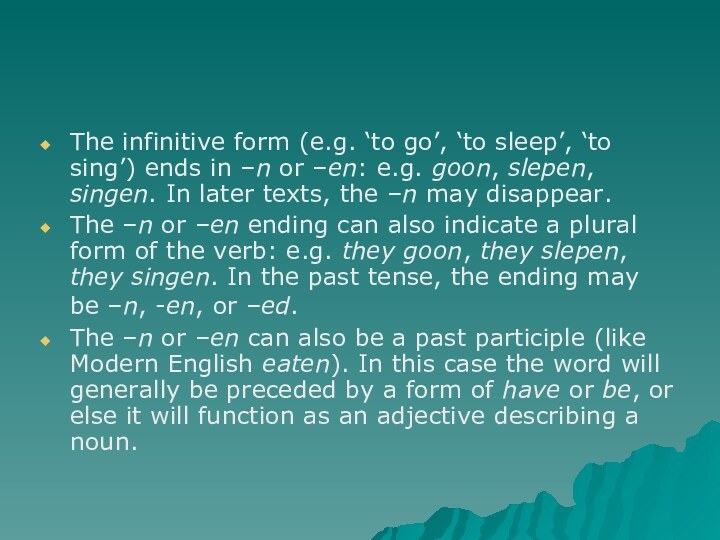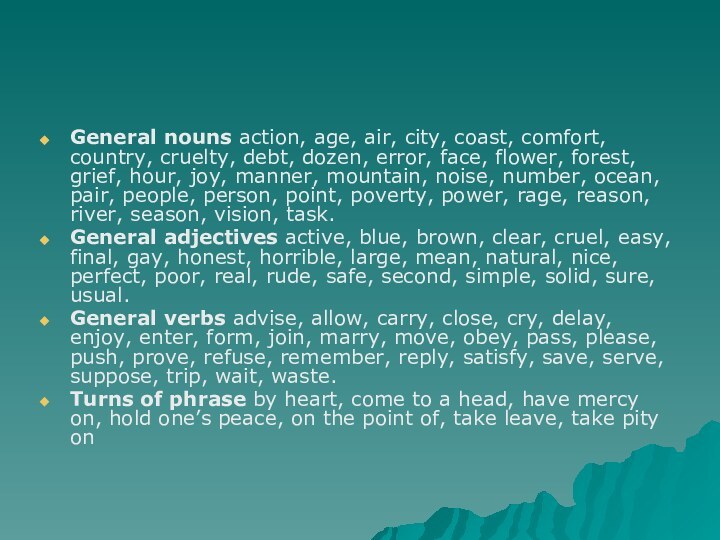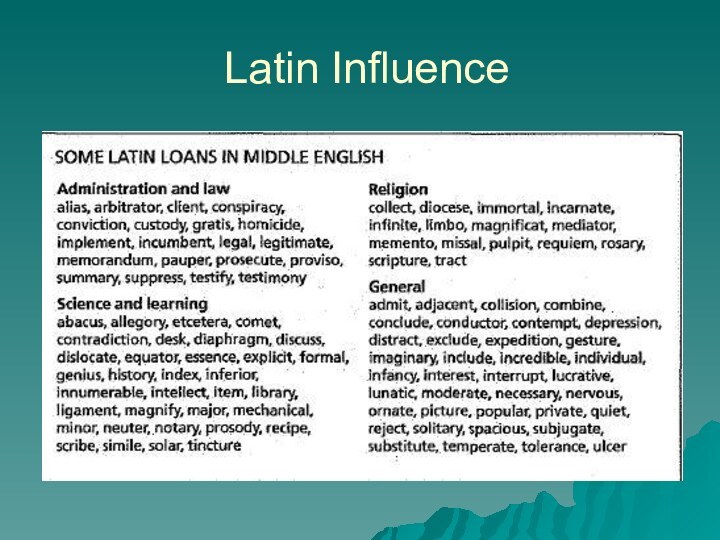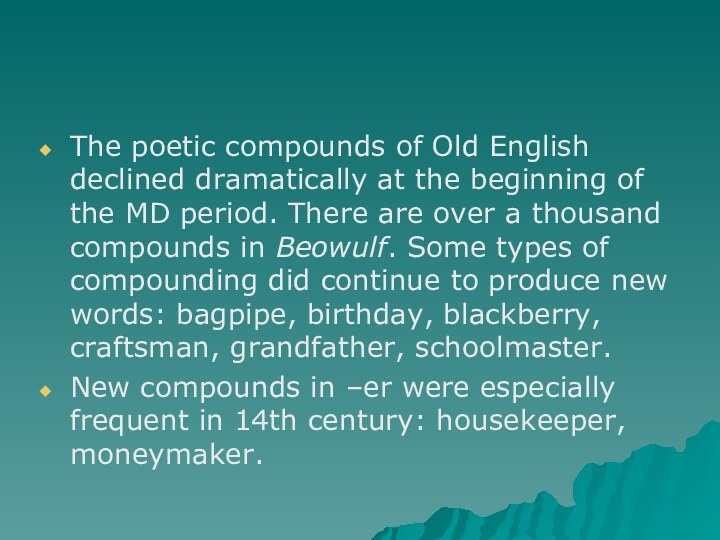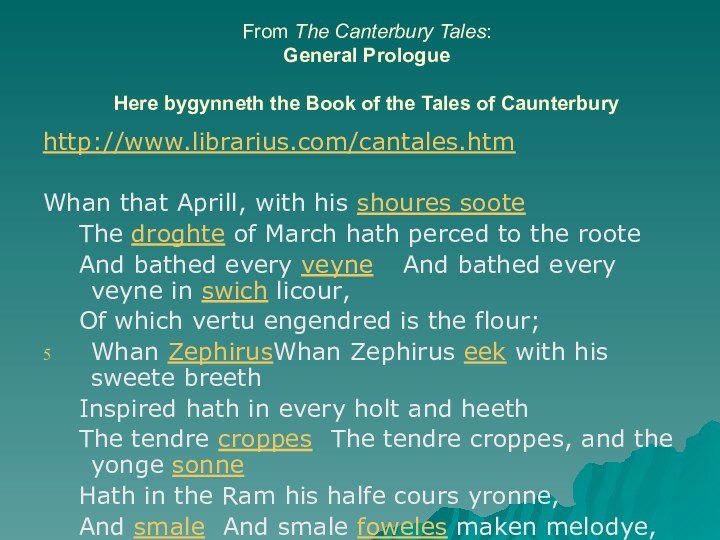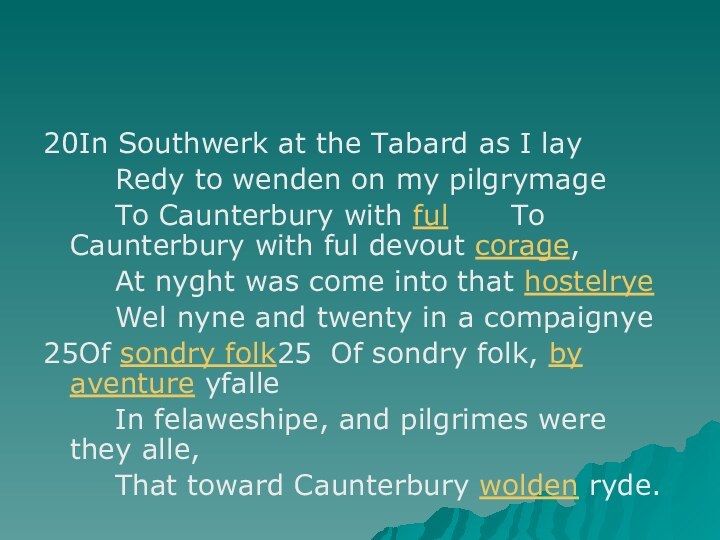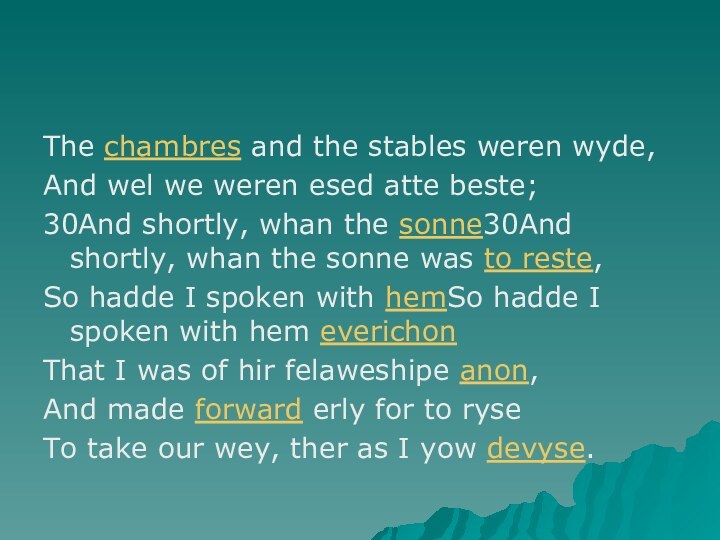Слайд 2
1. External history
1.1. The Norman Conquest and the
Subjection of English 1066 - 1200
1.2. The Re-establishment of
English 1200 - 1500
1.3. The Middle English Literature
1.4. Middle English Dialects
Слайд 3
1.1. The Norman Conquest and the Subjection of
English 1066 - 1200
At the beginning of the 11th
century the whole of England came under the Scandinavian rule – the Scandinavian invasion was completed and the Danish king was seated on the English throne.
In 1042 England was back under English power, the English king who came to the throne – Edward the Confessor – was to be the last English king for more than three centuries.
Слайд 4
In 1066 King Edward the Confessor died, and
the Norman Duke William, profiting by the weakness of
King Harold who succeeded King Edward on the English throne, invaded England.
He assembled an army, landed in England and in a battle of Hastings on October 14, 1066 managed to defeat Harold and proclaimed himself King of England.
Слайд 6
Nobility and government
The lands of the Saxon aristocracy
were divided up among the Normans, who by 1087
composed almost 10% of the total population.
Each landlord, in return for his land, had to take an oath of allegiance to the king and provide him with military services if and when required.
The Saxon machinery of government was immensely reinforced, with a Norman monarch and his officials.
The 13th century witnessed the appearance of the first Parliament, or a council of barons, which later was changed to a national Parliament.
Слайд 7
The Position of English
In the period up
to 1200 the attitude of the king and the
upper classes toward the English language may be characterized as one of simple indifference.
They did not cultivate English—which is not the same as saying that they had no acquaintance with it—because their activities in England did not necessitate it and their constant concern with continental affairs made French for them much more useful.
Слайд 8
The Linguistic Situation in England 1066 – 1200
The
French language - The English language - The Latin
Language
Thus came, lo! England into Normandy's hand.
And the Normans didn't know how to speak then but their own speech
And spoke French as they did at home, and their children did also teach;
So that high men of this land that of their blood come
Hold all that same speech that they took from them.
For but a man know French men count of him little.
But low men hold to English and to their own speech yet.
I think there are in all the world no countries
That don't hold to their own speech but England alone.
But men well know it is well for to know both,
For the more that a man knows, the more worth he is.
Слайд 9
1.2. The Re-establishment of English
A feature of some
importance in helping English to recover its former prestige
is the improvement in the condition of the mass of the people and the rise of a substantial middle class.
The rise of another important group—the craftsmen and the merchant class. By 1250 there had grown up in England about two hundred towns with populations of from 1,000 to 5,000; some, like London or York, were larger. These towns became free, self-governing communities, electing their own officers, assessing taxes in their own way, collecting them and paying them to the king in a lump sum, trying their own cases, and regulating their commercial affairs as they saw fit.
Слайд 10
1258 – Proclamation of King Henry III was
published besides French also in English
1362 – the English
language became the language of Parliament, courts of law; later, at the end of the century – the language of teaching
The rule of King Henry IV (1399-1413) – the first king after the conquest whose native tongue was English.
The end of 14th century also saw the first English translation of Bible
Chaucer was writing his English masterpieces in English
Слайд 11
1.3. The Middle English Literature
Period of Religious Record
(from 1150 to 1250)
Period of Religious and Secular
Literature in English (from 1250 to 1350)
Period of Great Individual Writers
(from 1350 to 1400)
Imitative Period or Transition Period
(15th century)
Слайд 12
Geoffrey Chaucer (C.1343-1400)
Geoffrey Chaucer was an English author,
poet and philosopher.
Слайд 13
The Canterbury Tales is a collection of stories
written in Middle English by Geoffrey Chaucer at the
end of the 14th century.
Слайд 14
Troilus and Criseyde is a poem by Geoffrey
Chaucer which re-tells in Middle English the tragic story
of the lovers Troilus and Criseyde set against a background of war in the Siege of Troy
Слайд 15
John Gower (c. 1330 – October 1408) was
an English poet, a contemporary of William Langland and
a personal friend of Geoffrey Chaucer.
Слайд 16
Vox Clamantis ("the voice of one crying out")
is a Latin poem of around 10,000 lines in
elegiac verse by John Gower that recounts the events and tragedy of the 1381 Peasants' Rising.
Слайд 17
Sir Gawain and the Green Knight is a
Medieval English romance in the Arthurian tradition. The text
is thought to have been composed in the mid- to late fourteenth century.
Слайд 18
1.4. Middle English Dialects
The Southern group included the
Kentish and the South-Western dialects
The group of Midland (‘Central’)
dialect – corresponding to the OE Mercian dialect – is divided into West Midland and East Midland as two main areas
The Northern dialects had developed from OE Northumbrian
Слайд 19
2. Internal History
2.1. Phonetic and Spelling Peculiarities
2.2 Grammatical
Changes in Middle English
2.3. Word-Stock Changes
Слайд 20
2.1. Phonetic and Spelling Peculiarities
New accentual patterns are
found in numerous ME loan-words from French. Probably, when
they first entered the English language they retained their original stress – on the ultimate or pen-ultimate syllable. This kind of stress could not be preserved for a long.
In words of three or more syllables the shift of the stress could be caused by the recessive tendency and also by the `rythmic` tendency. Under the `rythmic` tendency, a secondary stress would arise at a distance of one syllable from the original stress. This new stress was either preserved as a secondary stress or else became the only or the principal stress of the word.
Слайд 21
ME vertu [ver`tju:] > NE virtue ['vɜːʧuː]
ME recommenden
[reko`mendenən] > NE recommend [ˌrekə'mend]
ME disobeien [diso`beiən] > disobey
[dɪsə'beɪ]
ME comfortable [komfor`tablə] >NE comfortable ['kʌmf(ə)təbl]
ME consecraten [konse`kra:tən] > consecrate ['kɔn(t)sɪkreɪt]
Слайд 23
2.2 Grammatical Changes in Middle English
The most important
grammatical development was the establishment of fixed patterns of
word order to express the relationship between clause elements. There was already tendency towards Subject-Verb-Object order
Слайд 24
ME Noun
The plurals of nouns generally end
in –s or –es. However, some nouns end in
–n or –en (like Modern English ox, oxen), especially in earlier texts.
Possessive forms end in –s or –es. There is no apostrophe; possessives are distinguished from plurals by context.
Слайд 25
Middle English Verb
Principal Changes
- levelling of inflections
- weakening
of endings in accordance with the general tendency
- serious
losses suffered by the strong conjugation
Слайд 26
New verbs formed from nouns and adjectives or
borrowed from other languages were regularly conjugated as weak.
Thus the minority position of the strong conjugation was becoming constantly more evident. After the Norman Conquest the loss of native words further depleted the ranks of the strong verbs. Those that survived were exposed to the influence of the majority, and many have changed over in the course of time to the weak inflection
Слайд 27
Strong verbs which became weak
At a time when
English was the language chiefly of the lower classes
and largely removed from the restraining influences of education and a literary standard, it was natural that many speakers should wrongly apply the pattern of weak verbs to some which should have been strong.
Слайд 28
The infinitive form (e.g. ‘to go’, ‘to sleep’,
‘to sing’) ends in –n or –en: e.g. goon,
slepen, singen. In later texts, the –n may disappear.
The –n or –en ending can also indicate a plural form of the verb: e.g. they goon, they slepen, they singen. In the past tense, the ending may be –n, -en, or –ed.
The –n or –en can also be a past participle (like Modern English eaten). In this case the word will generally be preceded by a form of have or be, or else it will function as an adjective describing a noun.
Слайд 29
ME personal and possessive pronoun
Слайд 30
2.3. Word-Stock Changes
French Loans (about 3500 words)
Administration. Baron,court,
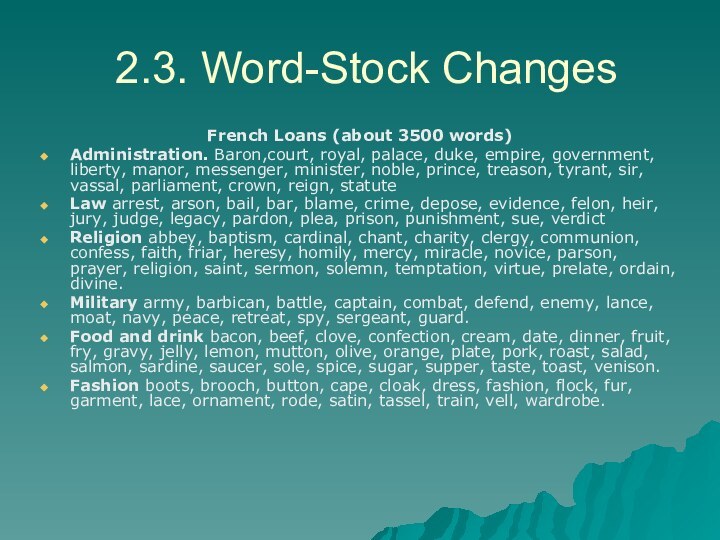
royal, palace, duke, empire, government, liberty, manor, messenger, minister,
noble, prince, treason, tyrant, sir, vassal, parliament, crown, reign, statute
Law arrest, arson, bail, bar, blame, crime, depose, evidence, felon, heir, jury, judge, legacy, pardon, plea, prison, punishment, sue, verdict
Religion abbey, baptism, cardinal, chant, charity, clergy, communion, confess, faith, friar, heresy, homily, mercy, miracle, novice, parson, prayer, religion, saint, sermon, solemn, temptation, virtue, prelate, ordain, divine.
Military army, barbican, battle, captain, combat, defend, enemy, lance, moat, navy, peace, retreat, spy, sergeant, guard.
Food and drink bacon, beef, clove, confection, cream, date, dinner, fruit, fry, gravy, jelly, lemon, mutton, olive, orange, plate, pork, roast, salad, salmon, sardine, saucer, sole, spice, sugar, supper, taste, toast, venison.
Fashion boots, brooch, button, cape, cloak, dress, fashion, flock, fur, garment, lace, ornament, rode, satin, tassel, train, vell, wardrobe.
Слайд 31
General nouns action, age, air, city, coast, comfort,
country, cruelty, debt, dozen, error, face, flower, forest, grief,
hour, joy, manner, mountain, noise, number, ocean, pair, people, person, point, poverty, power, rage, reason, river, season, vision, task.
General adjectives active, blue, brown, clear, cruel, easy, final, gay, honest, horrible, large, mean, natural, nice, perfect, poor, real, rude, safe, second, simple, solid, sure, usual.
General verbs advise, allow, carry, close, cry, delay, enjoy, enter, form, join, marry, move, obey, pass, please, push, prove, refuse, remember, reply, satisfy, save, serve, suppose, trip, wait, waste.
Turns of phrase by heart, come to a head, have mercy on, hold one’s peace, on the point of, take leave, take pity on
Слайд 34
The poetic compounds of Old English declined dramatically
at the beginning of the MD period. There are
over a thousand compounds in Beowulf. Some types of compounding did continue to produce new words: bagpipe, birthday, blackberry, craftsman, grandfather, schoolmaster.
New compounds in –er were especially frequent in 14th century: housekeeper, moneymaker.
Слайд 35
From The Canterbury Tales:
General Prologue
Here bygynneth the
Book of the Tales of Caunterbury
http://www.librarius.com/cantales.htm
Whan that Aprill, with
his shoures soote
The droghte of March hath perced to the roote
And bathed every veyne And bathed every veyne in swich licour,
Of which vertu engendred is the flour;
Whan ZephirusWhan Zephirus eek with his sweete breeth
Inspired hath in every holt and heeth
The tendre croppes The tendre croppes, and the yonge sonne
Hath in the Ram his halfe cours yronne,
And smale And smale foweles maken melodye,
Слайд 36
10 That slepen al the nyght with open eye-
(So
priketh (So priketh hem (So priketh hem Nature in hir corages);
Thanne
longen folk to goon on pilgrimages
And palmeres And palmeres for to seken straunge strondes
To ferne halwes To ferne halwes, kowthe To ferne halwes, kowthe in sondry londes;
15 And specially from every shires ende
Of Engelond, to Caunterbury they wende,
The hooly The hooly blisful The hooly blisful martir for to seke
That hem That hem hath holpen, whan that they were seeke.
Bifil Bifil that in that seson, on a day,
Слайд 37
20 In Southwerk at the Tabard as I lay
Redy
to wenden on my pilgrymage
To Caunterbury with ful To Caunterbury
with ful devout corage,
At nyght was come into that hostelrye
Wel nyne and twenty in a compaignye
25 Of sondry folk25 Of sondry folk, by aventure yfalle
In felaweshipe, and pilgrimes were they alle,
That toward Caunterbury wolden ryde.
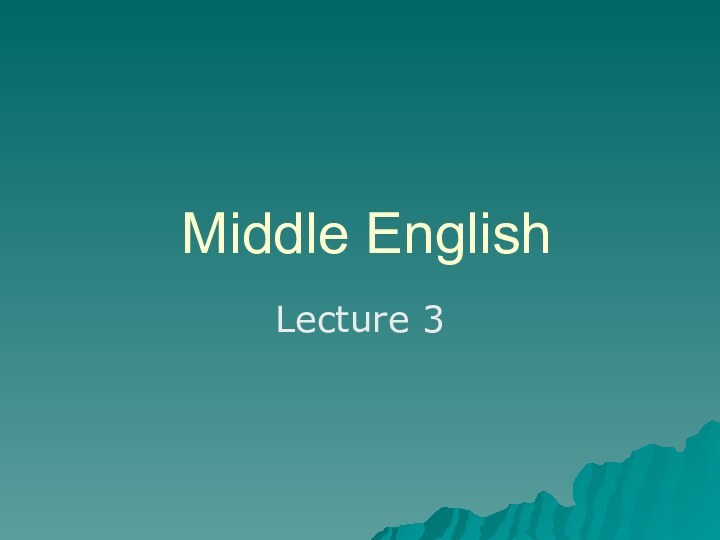
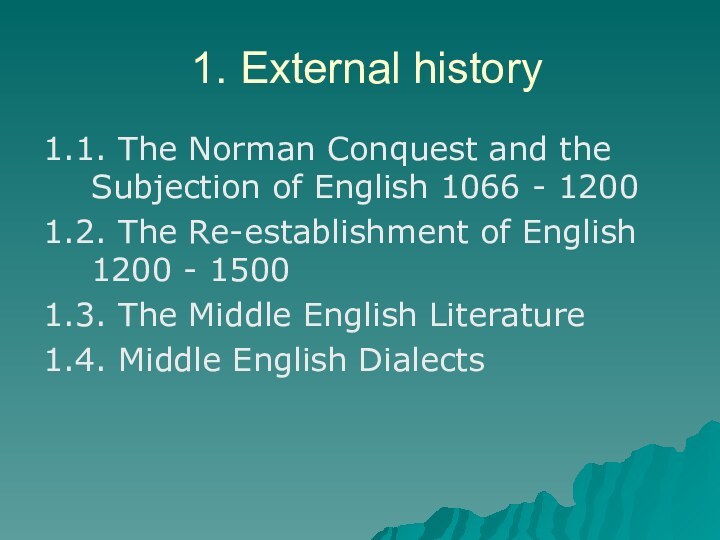

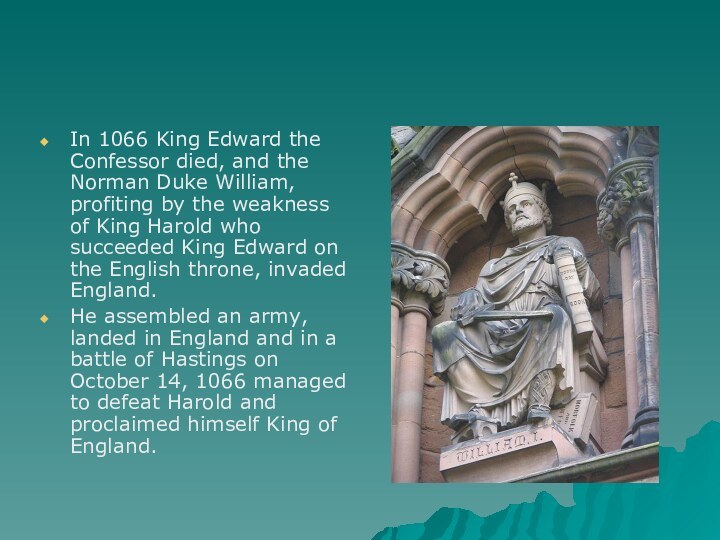

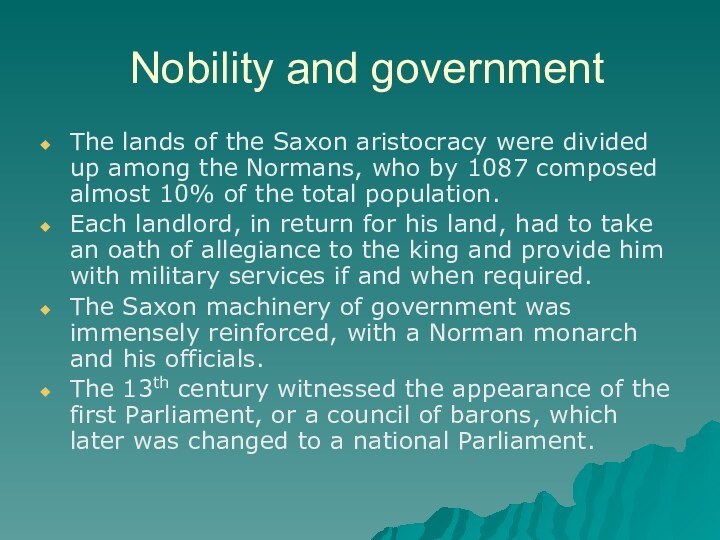
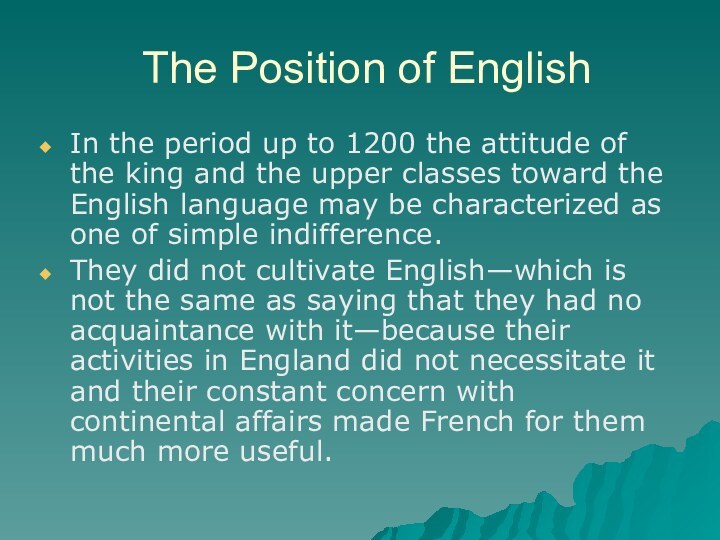
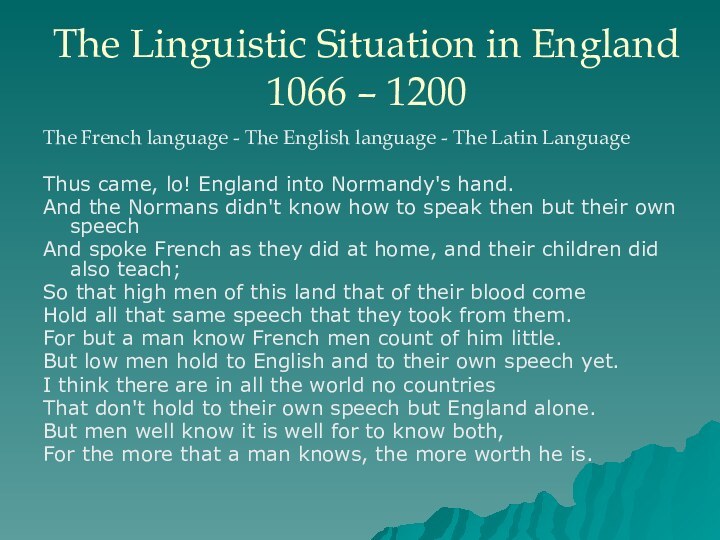
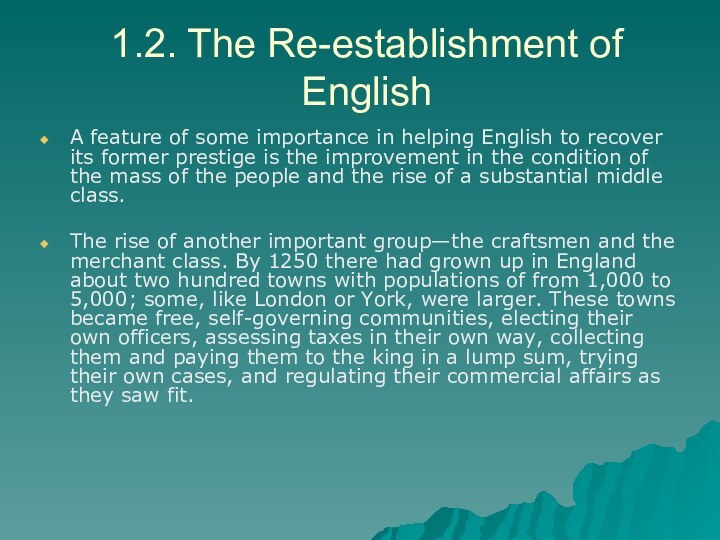
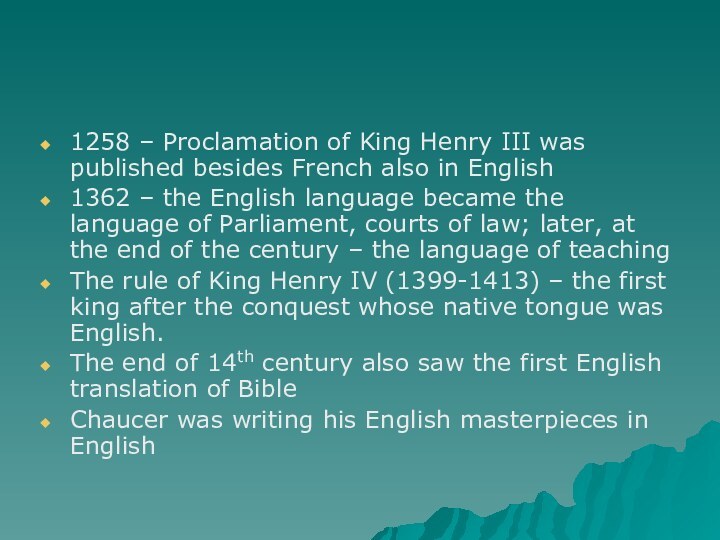
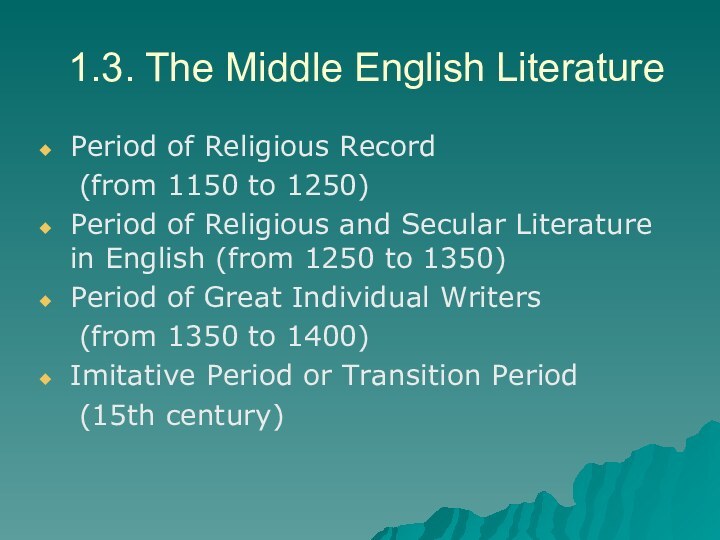




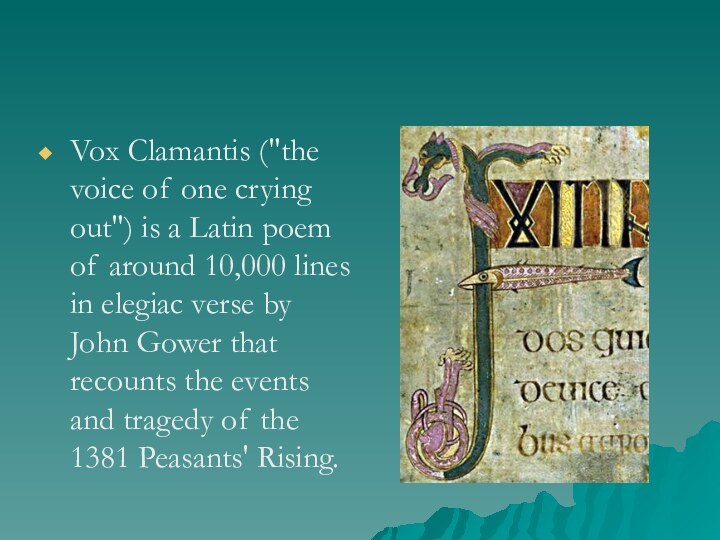
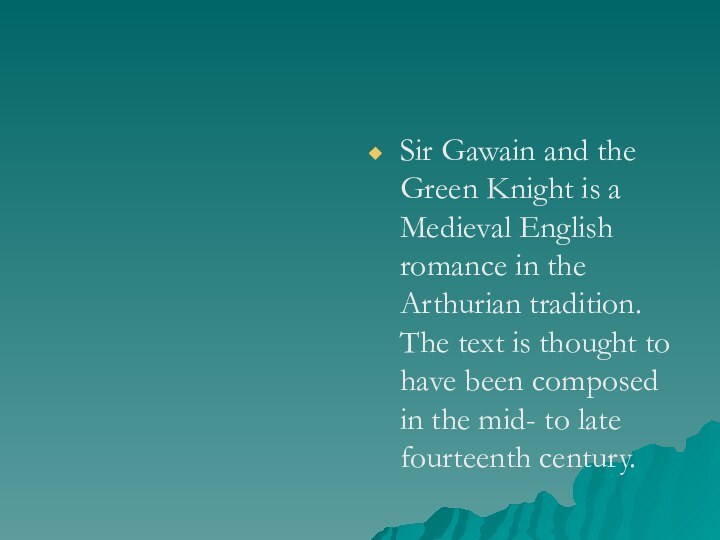


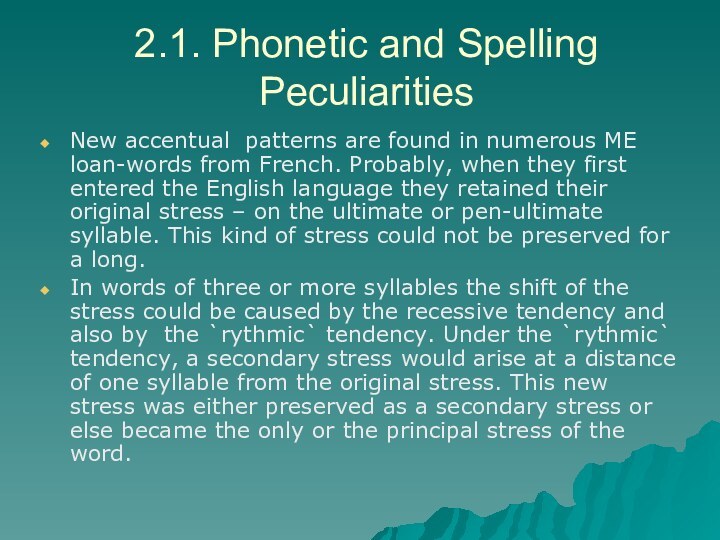
![Middle English ME vertu [ver`tju:] > NE virtue ['vɜːʧuː]ME recommenden [reko`mendenən] > NE recommend](/img/tmb/15/1409766/4d7e2bc335bb514ee811bae5c28b422f-720x.jpg)
